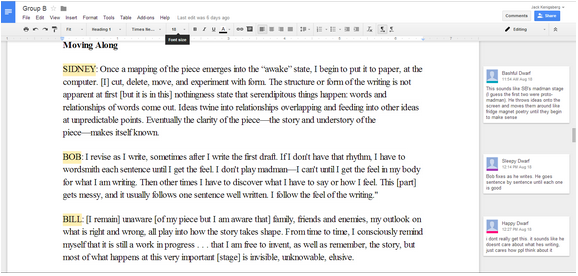
Jack Kenigsburg (25 Aug. 2014)
Overview: Students collaboratively annotate a text (I use Orlean Anderson’s “The Writing Process Rejected”) using annotation or commenting software (I use the “Insert Comment” feature on Google Docs). Students are divided into small groups, with each student in the group responsible to comment on only one section of the reading.
Teaching Tips: The choice of class reading is key to the success of this assignment. Ideally, it ought to have clearly dilenated sections so that students can see at a glance what they are — and are not — responsible for. My text of choice is because he interviews four different writers and follows them across the different stages of their writing processes. It’s easy to ask each student to become responsible for one of Anderson’s interviewee.
Here is a Sample assignment [Link]
Rationale: The CWPA, NCTE and NWP suggest that teachers ask students to “write about texts for multiple purposes including (but not limited to) interpretation, synthesis, response, summary, critique, and analysis” (7). This is mirrored by our goals for First Year Composition (FYC), the second of which asks students to “cultivate a critical, reflective, and recursive approach to reading, writing and research that uses writing to learn.” The annotation of texts, even on the level of summary and paraphrase, connects writing to reading in a fruitful way, and demands of students that they comprehend at least well enough to restate concepts in their own words.
While it would be possible to ask each student to annotate the entire text by him/herself, the collaborative nature of the assignment is meant to foster both critical reading skills and student responsibility.
By asking students to focus on only one section of a text, this assignment aims to bridge students’ global and local comprehension. Global comprehension refers to understanding “the main idea at the text or discourse level,” while local comprehension referes to the “main idea at the paragraph level” (Wang 35). Asking students to concentrate on a discrete section of a text (as opposed to the entire text) discourages them from thinking too broadly and too globally. Asking students to concentrate on an entire section of a text (as opposed to a singe paragraph) discourages them from thinking too narrowly or too locally.
The assignment also models good reading practice. In practice, many good readers skim through large swaths of text and concentrate on information that seems especially interesting or relevant.
The collaborative nature of the assignment also encourages a sense of responsbility bbetween students. The CWPA, NCTE and NWP consider responsibility as a key habit of mind for students, and explains that, in part, it can be “fostered when writers are encouraged to . . . act on the understanding that learning is shared among the writer and others—students, instructors, and the institution . . .” (5). When students are asked to rely on each other for a complete annotation of a text, they will (hopefully) feel responsible to each other, and not only to the instructor. It is for this reason that our third goal for FYC is for students to “collaborate with both instructor and peers at all stages of the writing process” — and of the reading process as well.
Works Cited
CWPA, NCTE, and NWP. Framework for Success in Postsecondary Writing. wpacouncil.org. 2011. Web.
Wang, Danhua. “Factors Affecting the Comprehension of Global and Local Main Idea.” Journal of College Reading and Learning, 39.2 (2009 Spring): 34-52.. Web.


0 responses to “Collaborative Comments”